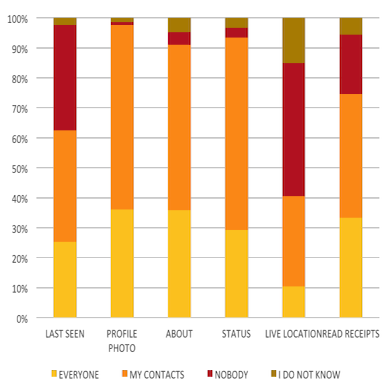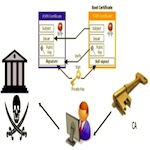 | | Physical risks are inherently defined by the physical environment. Cyber security risks are similarly defined by the combined physical and electronic environment. However, unlike the increased risk from speed in the rain on the highway at night, the dimensions of both the combined environment and the nature of the underlying risks are not so obvious. Physical risks are often transparent, and inherently aligned with human information processing capacity: contextual, often visual, and at a pace that fits well within a human narrative. In contrast, cyber risks are ill-suited for human risk perception: either they are literally invisible or identified in a decontextualized manner. There is a critical need in computer security to communicate risks and thereby enable informed decisions by average, non-expert computer users.
|
 | | The services offered by mobile apps are useful but these apps can also be privacy invasive, meaning that they compile and share more information than is needed for the task the app performs. For example, researchers at University of California Berkeley analyzed 940 apps and found that one third of them requested permissions for resources that were far beyond what was required for the functionality of the app. Such over-permissioning creates risk to both user security and privacy. These risks exist even in apps for the most vulnerable users, such as those that are designed for children. Currently, Android and iOS privacy ecosystems are grounded in permissions which control access to sensitive resources. These systems explicitly ask users for authorization to allow apps to access sensitive information. Therefore, in is important that permission requests effectively communicate privacy risk to the user so that they can make informed decisions.
|
 | | Our project involving privacy in social media focuses on studying the usability and implications of the design choices that developers make while building these systems. We look at widely used social networking platforms, especially ones that allow instant messaging, and study user behavior and attitudes on these platforms, and their socio-economic implications.
|
 | | Passwords and Multi-Factor Authentication improve security and protect essential data of users online. However, the usage of simple and guessable passwords or compromised credentials often lead to several threats online, such as, Identity Theft, Financial Loss, etc. Irrespective of attacks, such as spear phishing attacks being present known for a long time, users still fall prey and sometimes fail to adapt to newer and safer technologies. One such technology is multi-factor authentication technology where in addition to passwords and username, users can authenticate through a second or third factor of authentication such as, One Time Passwords, SMSes, Tokens, Biometeric, etc. Our researchers investigate through detailed usability and adaptability research to understand user’s mental models and risk perception and unpack the difficulties an individual face to adapt such secure and helpful technologies. Several reasons contribute to lower security practices by an individual, including the ignorance or lack of knowledge of the users but also poor and transparent risk communication from security practitioners and organizations. Our user studies follow qualitative, quantitative, and mixed methods and provide actionable items and effective insights which contribute in improving the security practices of individuals and in turn enable protecting the online user data.
|
 | | Public key certificates are technologies of trust. Many aspects of the current X.509 trust system are broken, illustrated not only by the academic computer security literature, but by recent news stories. Alternative trust models (e.g., Perspectives, DANE, pinning) and modifications to the current infrastructure are built upon threat models that address neither human trust behaviors nor emerging trust domains. Specifically, these alternatives are being proposed in the context of a future network that is integrated with an Internet of Things but are not designed for that environment. Such things and the attributes certified should be aligned with reasonable expectations what the person living with the technology.
|
 | | My work combines large-scale modeling and datasets with targeted smaller experiments to create effective insights for the greater whole. In routing, we combined large scale route views with geographical and political data for measures of trustworthiness of route updates. In certificates we combined small scale local browsing communities with terabytes of certificate data, proving that important features for the detection of rogue and phishing certificates is the geography and governance of the recipient, the entity certified, and the certificate authority. In addition our group has implemented traditional macroeconomic regression techniques to identify features that are correlated with different types of ecrime.
|
 | | Concerns regarding the environment and the impact humans constantly have on it have been growing concerns for decades, but there is still a substantial lack of environmental literacy and action among most of the population in what they can do to reduce the damage they may be indirectly causing. The environmental impact of technology usage continues to garner attention as fears of built in obsolescence and high turnover of devices contribute to larger negative impacts. Our research aims at increasing environmental literacy and awareness along with giving users actionable steps and interactions to empower them with greater control of their individual carbon outputs and carbon footprints.
|
 | | Accurate communication of risk is not only an issue of high accuracy of underlying data but also in correctly designed simple communication. Past work on risk communication and usable privacy have focused primary on two cases: privacy risk via permissions in Android and security risks in browsing. Accurate feedback requires communication of risk, learning from the feedback, and aligning with user mental models.
|







